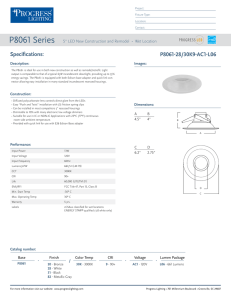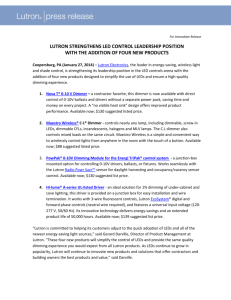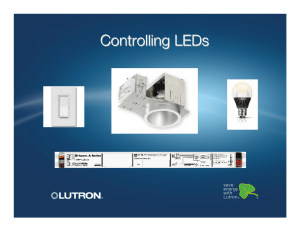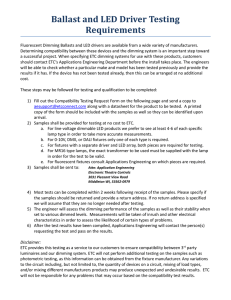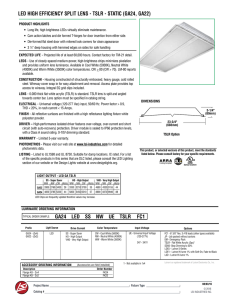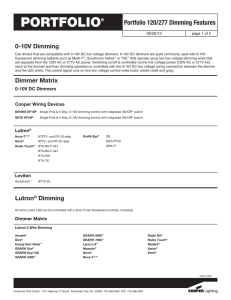Become and LED Lighting and Controls Expert
advertisement
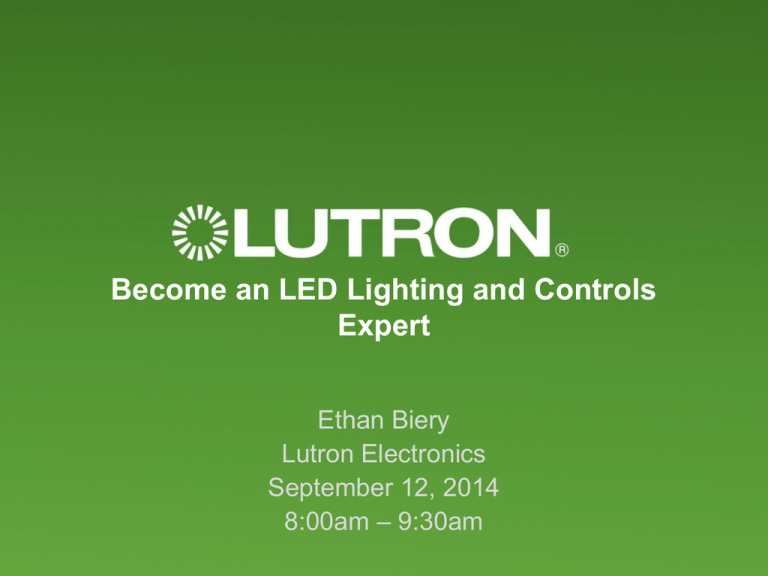
Become an LED Lighting and Controls Expert Ethan Biery Lutron Electronics September 12, 2014 8:00am – 9:30am Agenda • • • • • Background Challenges of controlling LEDs Lutron product solutions Tools and resources Questions So what’s the problem? LEDs are like a box of chocolates… …you never know what you’re going to get! Why do customers want LEDs? • • • • • • Saves energy Long lasting Environmentally friendly Elegant form factors New functionality (color!) “Everybody’s doing it” Why are LEDs “hard”? • • • • • New market players Technology is changing rapidly Products are more complicated Compatibility is not assured LED lamps are different than incandescent lamps! ≠ Terms: Color rendering index (CRI) • CRI describes how well (accurately) a light source shows color compared to a known reference light source • Tested against a standardized color swatch set • Higher is better, 100 is best – LEDs: typically >80 (>95 is available) – Sunlight / incandescent lamps: 100 (maximum) Photo: Javier Ten, RPI Lighting Research Center Fair 50-60 CRI Standard Fluorescent 60-70 CRI Premium HPS Standard Metal Halide Better 70-80 CRI Thin-coat Tri-Phospher Fluorescent Best 80-90 CRI White HPS Warm Metal Halide Thick-Coat Tri-Phospher Fluorescent 90-100 CRI High CRI Fluorescent Incandescent and Halogen Terms: Correlated color temperature (CCT) • The color emitted from a heated “black body” radiator • Higher temperature = cooler color (bluer) • Low temperature = warmer color (redder) • Measured in degrees Kelvin (K) – LEDs: 2200K - 6000K+ – All tungsten: 2700K* – All halogen: 3000K* * Warms (lower CCT) when dimmed 10,000 K Blue sky: 10,000-20,000 K 9,000 K 8,000 K 7,000 K Overcast sky: 6,000 – 7,500 K 6,000 K Daylight (sun & sky): 5,500 – 6,500 K 5,000 K Direct sunlight at noon: 5,000 – 5,400 K 4,000 K Cool white fluorescent: 4,200 K 3,000 K Halogen: 3,000 K Tungsten Incandescent: 2,700 K 2,000 K 1,000 K Sunset/Sunrise: 2,000 K Anatomy of an LED system: Fixture Dimmer Driver Optics LED Module Determines compatibility and ergonomics Determines compatibility AND best possible dimming performance Determines beam spread Determines light quality Anatomy of an LED system: Lamp Dimmer Driver Optics LED Module Determines compatibility and ergonomics Determines compatibility AND best possible dimming performance Determines beam spread Determines light quality Why drivers matter If you only remember two things… 1. The LED driver design determines the best possible dimming performance Dimming range (non-dim, 20%, 10%, 1%...) Dimming curve (linear, logarithmic, monotonic…) Dimming smoothness 2. The compatibility between the LED driver and the control determines to what degree the driver can deliver upon its designed performance The wrong dimmer will make a great driver dim poorly Even a perfect dimmer can’t make up for a bad driver Having a reliable driver will eliminate the common concerns of LED lighting (flicker, loading, dimming performance…) Steps to a successful LED dimming installation Ideally: 1. Determine the dimming range needed by the application 2. Select whether an LED lamp or LED fixture is appropriate 3. Choose the appropriate control type 4. Confirm maximum/minimum number of loads on the control 5. Adjust trims and load types as necessary 1. Determine the dimming range needed Measured vs. Perceived • Measured light: the amount of light as shown on a light meter • Perceived light: the amount of light that your eye interprets due to dilation • Example: 20% measured = 45% perceived • Different applications have different low-end needs • Different LEDs have different low end light levels 2. Select an LED lamp or LED fixture LED Lamps (LEDis) • Designed to replace/retrofit standard incandescent or screw-in CFL bulbs • Standard Edison (E26) base sockets, as well as candelabra & MR16 • Integral drivers determine dimming performance (if dimmable) • Easy to install, generally lowest cost LED Fixtures • Variable in purpose (cove lights, down lights, 2x2, etc.) • Usually have an external driver, selected by the OEM and mounted as part of the fixture housing • OEMs may offer different control technologies (dim vs. non-dim, 0-10V vs. DALI) • Sleek and elegant, precise optical control 3. Choose the appropriate control type • Control type refers to the signal and wiring between the wall control and fixture / lamp – – – Lamps generally use only forward/reverse phase control Fixtures can use any method The LED and control MUST be of the same control type! • Control options – – – – – – Forward Phase Reverse Phase 3 Wire DMX 512 0-10V EcoSystem Control type summary • Forward Phase – Most common dimming method (150 million dimmers in use) – Designed for resistive (incandescent, halogen) or magnetic lowvoltage (MLV) loads; not originally intended for LEDs – Performance issues possible on existing dimmers Hot Dimmed Hot Neutral 0 90 180 270 360 Applicable LED-rated Controls Caseta RadioRA 2 HomeWorks QS PD-6WCL, PD-3PCL RRT-G25LW, RRD-6NA, RRD-6CL, RRD-10ND HWQS-6NA, HWQS-6CL, HWQS-10ND Control type summary • Reverse Phase – Typically used for ELV loads, sometimes perform better with LEDs (or select LEDs may require reverse-phase) – Smaller installed base, always require a neutral wire Dimmed Hot Hot 00 90 90 180 180 270 270 360 360 Neutral Applicable LED-rated Controls Caseta N/A RadioRA 2 RRD-6NA HomeWorks QS HWQS-6NA, 4A Panel Module Control type summary • 3 Wire – Fluorescent standard, control signal carried separate from power – Precise, less prone to noise, but requires a third line voltage wire Hot Switched Hot (power) Dimmed Hot (signal) AC Power Neutral Applicable LED-rated Controls Caseta N/A RadioRA 2 RRD-F6AN HomeWorks QS HWV-FDB-8A Control type summary • DMX-512 – – – – – Popular in theater applications & RGB LED control Multiple channels for individual color control Possible to use for single color general applications Complicated wiring for general illumination Often requires an interface and more complex programming and installation Applicable LED-rated Controls Caseta N/A RadioRA 2 N/A HomeWorks QS LUT-DMX Control type summary • 0-10V – Analog control standard, low voltage (simplified wiring) – IEC standard exists for general illumination, not always followed (alternate incompatible standard also exists) – Requires low voltage output AND line voltage switching – Often require an interface Switched Hot (power) Hot 0-10V +/AC Power Neutral Applicable LED-rated Controls Caseta RadioRA 2 HomeWorks QS GRX-TVI Interface GRX-TVI Interface, 0-10V PowPak GRX-TVI Interface, 0-10V PowPak, TVM2 Panel Module Typical 0-10V system architecture Only one control device supported per zone All light sources receive the same control signal Control type summary • EcoSystem – Allows digital addressing of individual fixtures and status feedback – Allows assignment to occupancy sensors, timeclocks and controls to one or many fixtures without added wiring – Based off of DALI IEC standard (with some manufacturer-specific extensions) Hot EcoSystem AC Power Neutral Applicable LED-rated Controls Caseta N/A RadioRA 2 N/A HomeWorks QS Grafik Eye QS, DIN Rail Power Module 0-10V vs. EcoSystem Lutron EcoSystem 0-10V Simple reprogramming Re-circuiting and re-wiring Polarity and topology free wiring Yes No Lights track together Yes May not over long wire runs Automatic ballast replacement Yes N/A Guaranteed compatibility controls + drivers Yes No Extensive No Fixture by fixture information Generally circuit level information (depends on amount of control interfaces) Re-zoning ability Load feedback BMS integration Special case: MR16 lamps • Huge issue for very popular MR16 lamps • Two compatibility requirements – LED lamp and step-down transformer – Step-down transformer and dimmer • Step-down transformer characteristics are often not known (and not locatable) for retrofits • Both magnetic and electronic transformers designed for LV systems were typically designed for halogen (not LED) loads – Simply pairing an MLV dimmer with a magnetic transformer or ELV dimmer with an electronic transformer does not guarantee success with LED loads Special case: MR16 lamps • Both dimmer and step-down transformer (ELV or MLV) may have minimum loading requirements Minimum load and compatibility requirements both here and here The right dimmer type (MLV/ELV) must be used AND compatibility confirmed! Control quick comparison Control Technology Forward Phase Reverse Phase Type Analog line voltage Analog line voltage Wiring 2: Hot / Dimmed Hot 2: Hot / Dimmed Hot 3: Hot / Switched Hot / Dimmed Hot 3-wire Analog line voltage EcoSystem Digital low voltage 2: E1 / E2 DALI Digital low voltage 2: D+ / D- 0-10V Analog low voltage 2: +/- DMX Digital low voltage 2: D1 / D2 ClearConnect Wireless N/A Notes Most common type of dimmer installed Typically requires a neutral wire Originally developed for highperformance fluorescent dimming Allows easy programming and zoning changes after installation Open standard, not always compatible Open standard, performance difficult to predict Often used with theatrical or colorchanging fixtures Available in limited products so far 4. Determine maximum & minimum loads • Most new Lutron dimmers have LEDspecific load ratings and ratings for mixed loads • LED load power ratings are LOWER than incandescent ratings • LED dimmers have low minimum loads (e.g., 10W or one lamp) 2 load ratings 5. Set load type and trim settings • Default (incandescent) settings may not provide smooth dimming performance on LED loads – Low end too low: dead travel, flicker, drop-out – High end too high: dead travel • Incorrect load type (for adaptive dimmers) may provide unreliable operation – Loads may operate differently on forward vs. reverse phase • See individual control instructions for setting trim and load type • See LED load specifications or compatibility tables for recommended settings Risk mitigation and best practices • Understand product dimming performance in advance – “Dims from 100%-0%” (what’s just before 0%?) • Follow recommendations from fixture and/or control manufacturer – Beware: they may vary! • Do mock-ups – Use real amounts of load in real applications • Develop trusted sources – Who will support you if things don’t go as expected? • Understand that installed legacy dimmers weren’t designed for new LED loads – always use dimmers rated for LEDs • System “tuning” may be needed – Load type setting – Low end / high end trim adjustment Fixing dimming problems • Often there are no good solutions once products are installed • Common “fixes” – – – – – Change the LED load Use a different driver (if possible) Use a different control (with neutral?) Add incandescent or dummy load Add additional wires and/or interface devices and/or minimum load box • Who is responsible? Who pays? • Compatibility must be determined BEFORE products are ordered and installed! Product Solutions Summary of different LED Product Solutions Solution Fixtures Product Caseta RA 2 HW QS Finiré Lumaris Aliante, L’ale, Rotare Hi-lume A-Series Drivers EcoSystem 5-Series Phase Adaptive Dimmer Grafik T C.L Dimmer Phase Control Dimmers Panel Dimming Modules Finiré by Ivalo LED Recessed Lighting • 4” downlight, wall wash, and adjustable luminaires • Flicker-free dimming down to 1% with Lutron Hi-lume A-Series LED Driver • Guaranteed performance and compatibility of fixture, driver, & control • Options include 2700K, 3000K, or 3500K CCT; trim or trim-less; IC rated or standard • Industry best color consistency and available 98 CRI – Standard offering is 83 CRI • Industry best 5 year warranty on fixture, driver, and LED color consistency www.lutron.com/finire Lumaris by Ivalo LED Linear Lighting • Sleek LED system that provides high-quality, uninterrupted lines of LED illumination • Flicker-free dimming down to % via UL-listed Hi-lume A-Series LED driver – Driver can be remote mounted up to 180’ away • Now available in brown, silver or black with clear or frosted lens • 30° and 60° bracket options available • 95 CRI; 2700K or 3500K options • Industry best 5 year warranty on fixture, driver, and LED color consistency www.lutron.com/lumaris LED pendant and sconces by Ivalo • High-end pendant and sconce fixtures now available in LEDs • Flicker-free dimming down to 1% with Lutron Hi-lume ASeries LED Driver • Guaranteed performance and compatibility of fixture, driver, & control • 95 CRI; 2700K or 3500K options • Industry best 5 year warranty on fixture, driver, and LED color consistency C•L Controls • Available in standalone, Caseta, RadioRA 2, and HomeWorks QS varieties • 2-wire (non-neutral) high-efficacy load dimmer • Controls dimmable CFL, LED, and INC/HAL/MLV loads designed for forward phase control • Controls up to 150W of dimmable CFL/LED loads or 600W of INC/HAL/MLV • 10W minimum load or 1 LED bulb • Adjustable low end trim Hi-lume A-Series LED driver family • Flexible platform with many options offering smooth, continuous, addressable, 100%-1% dimming • Versions available up to 53W maximum load • Multiple dimmer control types – Phase control (Caseta, RA2, HWQS) or digital EcoSystem (HWQS) control options • Various enclosure sizes, including UL Listed remote mountable (ideal for tape light) www.lutron.com/hilumeled EcoSystem 5-Series LED driver family • • • • • • Built on the EcoSystem platform (HomeWorks QS only) Provides smooth, flicker-free dimming from 100%-5% A low price solution for high quality LED dimming 50,000 hour lifetime at worst-case conditions Various current and power configurations for 5-75W fixtures Can be remote mounted up to 50ft away from fixture www.lutron.com/ecosystem5series Phase adaptive controls • Available in RadioRA 2 and HomeWorks QS varieties • Controls incandescent, halogen, MLV, ELV & LED lighting designed for forward or reverse phase control • Up to 600W maximum load, requires a neutral wire • Adjustable minimum load and default load type • Minimum load: 5W or 1 LED bulb Grafik T CL dimmer • Neutral-optional, highefficacy load dimmer • UL Listed to control: – Up to 250W of compatible CFL/LED loads – 600W of INC/HAL – 300 VA MLV – Up to 8 Lutron A-Series LED drivers • Minimum load varies based on application (as low as 5W or 1 LED lamp) • Adjustable low-end trim www.lutron.com/GrafikT Tools and Resources Summary of tools and resources Tool Description Link High Performance Fixture List List of fixtures available with Lutron drivers www.lutron.com/findafixture Compatibility Lists List of loads compatible with a variety of controls www.lutron.com/dimcflled LED Product Selection Tool Report Cards on select LED loads with detailed compatibility information www.lutron.com/ledtool Whitepapers and resources Background information and related links www.lutron.com/leds LED Center of Excellence Specially trained tech support resources leds@lutron.com 877-DIM-LED8 RadioRA 2 and HomeWorks compatible controls www.lutron.com/dimcflled LED Product Selection Tool www.lutron.com/ledtool LED Report Cards Limitations to recommendations • Lutron recommendations are tested with up to 150W of load • Only loads which perform well enough in most applications on multiple dimmers have Report Cards – For example, LEDs must dim to at least 20% measured light • Only listed dimmers are approved; “similar” dimmers may have different performance – Check with the LED Center of Excellence with questions • Lutron can only list solutions for products which are ULapproved for LED loads High Performance LED Fixture Tool • Lists fixtures from OEMs that contain Lutron drivers or EcoSystem technology – Updated regularly • Guaranteed dimming performance and control compatibility • Hundreds of fixtures listed: – – – – – Accent Lights Coves Downlights Grazers Pendants Slots Strips Track Linears Sconces… www.lutron.com/findafixture Summary of solutions More Less Risk Level Untested products Untested; dimming performance with drivers by unknown or uncertain others Loads on Compatibility Lists or LED Product Report Cards Lutron-tested compatibility and confirmed dimming performance Fixtures with Lutron drivers Lutron-guaranteed compatibility and dimming performance Ivalo fixtures Lutron-guaranteed light quality, compatibility, and dimming performance LED Control Center of Excellence • A resource for you and your customers to get answers on any LED control question, including: – – – – Compatibility lists Tested/non-tested products Whitepapers and presentations Educational information to share with customers • Ways to reach us: – 1-877-DIM-LED8 – LEDs@lutron.com – www.lutron.com/LED Summary • Using LED loads is not the same (not as easy!) as using previous technologies • Successful projects depend on selecting the proper load and control early in the design process • Understand that changing the load or the control may impact performance • Fixing dimming compatibility “in the field” is costly and time consuming; LED-compatible controls should be selected for all designs today, regardless of the load type initially needed Summary • Lutron is the leader of controlling ANY light source, including LEDs: – Product innovation and performance – Customer education and support – Industry involvement and leadership • Using Lutron products and resources simplifies the selection of LED lighting fixtures and controls – Use Lutron C•L products and drivers – Follow recommendations from the LED Center of Excellence • Lutron’s LED fixture, driver, and control solutions are available to control hundreds of fixtures globally with known performance and compatibility Further questions…?
